Written
on the Wind
1956
Director: Douglas Sirk
Starring: Lauren Bacall, Rock Hudson,
Robert Stack, Dorothy Malone
I’m
not a big fan of melodrama. I find them
sappy, dull, ridiculously manipulative, and tiresome. So imagine my surprise when I rewatched Written
on the Wind, only one of the most renowned filmed melodramas of all
time, and thoroughly enjoyed myself in the process. The reason for this is undoubtedly Douglas
Sirk, King of the Melodrama. Sirk’s
approach to the genre is unique, biting, intense, many-layered, and
interesting. There’s a helluva lot going
on in Written on the Wind beyond the narrative, and I really
appreciate that.
The
ridiculously soapy plot centers on a quartet of characters. We open with Lucy (Bacall), a working gal,
who gets selected by Mitch Wayne (Hudson) to be the next plaything for his
lifelong friend Kyle Hadley (Stack), heir to an oil fortune. Kyle is an alcoholic and outrageous wild
child; Mitch is quiet, reserved, responsible, and practically an adopted member
of the Hadley family despite his poor financial status. Lucy balks at Kyle’s attempts to woo her with
fortune, which makes Mitch like her, but also makes Kyle like her even more. Kyle and Lucy impulsively wed and she tries
to reform him. When they meet the last
member of the quartet, Kyle’s kid sister Marylee (Malone), another wild child
who has harbored a lifelong love for Mitch, Marylee’s antics and Kyle’s
paranoia and insecurities soon start to pull everything apart.
I’ll
deal with the narrative first. This
movie is Over The Top – the capitalization is required. Don’t think too hard about how Kyle and
Lucy’s courtship is so damn short and wait, I thought she didn’t like him, and
holy cow, that’s a cheesy line he threw her way. It’s just a prelude to getting all four of
our main characters under the same roof.
Once Marylee enters the picture, you start to understand the definition
of “full tilt,” because that’s how Sirk plays it. This is not about believability, ladies and
gentlemen. This movie spins with the
same giddy energy of film noir, where everything is dark and dank and evil and
shady. In noir, that energy drives the
story of crime and desperation. Here,
the energy crackles throughout the story keeping the volatility sky high. I usually grow tired of melodramas as I find
them tedious. I would hardly call Written
on the Wind tedious.
And
yet, through his utterly ridiculous story of greed and paranoia and infertility
and power, Sirk manages to make a very clear social statement. Written on the Wind is a fairly
searing indictment of the follies of the wealthy; despite their riches, the
Hadleys are deeply troubled, mostly through their seeking of power or
constantly needing to validate their own power.
Kyle is deeply insecure and, it is implied, impotent. He has a lengthy discussion with Lucy at the
beginning of the film that focuses mostly on Mitch, and Sirk is constantly
implying that it is Mitch that wields the real power in this relationship, and for
all of Kyle’s braggadocio, he is painfully aware of how small he really
is. Marylee is a nymphomaniac who throws
her cooch all over town, except when she’s aggressively pursuing the one man
she really wants – Mitch. Again, it is
Mitch who holds the power; he is the only one who could get Marylee to do
something. Kyle and Marylee together do
not react well to their lack of control, their lack of power, and they lash out
in harmful and self-destructive ways.
These are the rich, according to Sirk.
Sirk
also freely uses symbolism throughout the film.
Lucy and Mitch, who hail from the middle class and are steady and
responsible (and also, frankly, boring), are constantly dressed in neutrals –
browns, greys, and tans (even a rather ridiculous beige baseball cap worn by
Rock Hudson pops up). Kyle and Marylee,
on the other hand, are costumed in bright colors that radiate off the screen
thanks to the Technicolor production.
Guns are surprisingly frequent, given that this is a “weepy woman’s
picture” about the melodrama of a rich family.
A clear representation of both power and violence, Kyle is paranoid as
he makes certain he is constantly surrounded by guns although he rarely, if
ever, wields one himself. Mirrors are
abundant throughout the sets, something common to Sirk’s films. “The mirror is the imitation of life. What is
interesting about a mirror is that it does not show yourself as you are, it
shows you your own opposite,” quoting the director himself. That is precisely what we have here. The mirrors are representing a façade – perhaps
the one we want to present to the world, perhaps the one we show to ourselves,
perhaps the one others see. But they do
not represent truth, merely a weakly reflected version of it. The color red is positively everywhere in Written
on the Wind (except for the clothing of Lucy and Mitch). Chairs are red, bedspreads are red, cars are
red, the stairs are red. Red flowers are
in nearly every scene involving the wealthy, perhaps signifying their passion
and violence and uncontrolled emotions.
Red represents danger, or signs to stop.
Lastly, the film is chockablock full of phallic imagery. That’s no mistake that Sirk placed red
Anthurium flowers in Marylee’s room – the dang things are more than slightly
provocative. The ending – Marylee
literally fondling a statue of an oil well, which looks like a… well, you know…
couldn’t be much clearer. Kyle’s
infertility and implied impotence is given additional heft by these constant
references.
It’s
a little surprising that, given the cast includes Bacall, Hudson, and Stack,
the one actor with whom I am least familiar is the one who captivated me the
most. Dorothy Malone rightly won a Best
Supporting Actress Oscar for her role as Marylee. Marylee is full-on unhinged, and Malone does
not hold back in getting that across.
She likes fucking and looks like she doesn’t do it nicely. She’s conniving and mean-spirited and is not
above threatening imprisonment and general ruination in order to get her
way. Given Marylee’s sexual impropriety
and Kyle’s impotence, there’s more than a bit of a hint of an incestuous past
between the two. Malone is tremendously
fun to watch here.
My
first pass through this film, it barely registered. I watched it then promptly forgot it. I was not intrigued to watch it again, but it
was playing on Turner Classic, so I thought “what the heck.” Everyone always made such a fuss about
Douglas Sirk, that even though I had never noticed a dang thing about his
movies, I owed it another shot. I always
think a movie deserves a second shot – I never make up my mind about a movie
until at least twice through a picture.
For Written on the Wind, I’m not sure why I forgot it the first
time around. There’s a lot here. For “just a melodrama,” this is a
surprisingly dense film. Sirk was not
merely throwing random lines or images or characters on the screen. There is meaning here. There are layers. I’m fascinated by that, and to find it in a
melodrama is unexpected – and refreshing.
And
heck, if all you want is a soapy story, Written on the Wind will fit that
bill as well. Because honestly, it
doesn’t get much more ridiculously soapy than this, and I found that
tremendously entertaining.
Final
verdict: soapy, trashy fun with all kinds of subversive meanings. And editing to add - in the weeks since I saw this for a second time, I keep on thinking back to it fondly. The more I think about this movie, the more I like it. REALLY like it. Want-to-own-it sort of like it. And believe you me, I was not expecting to enjoy it that much when I put it on for a second viewing.
Arbitrary
Rating: 8.5/10

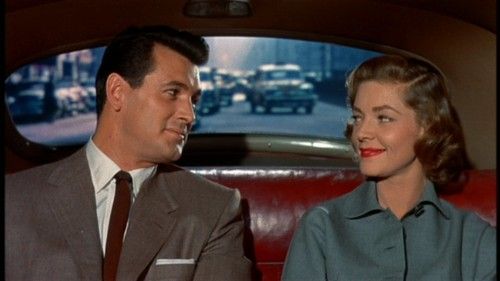
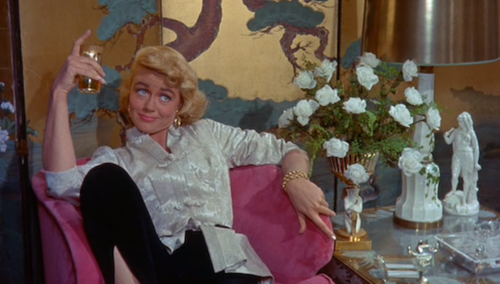

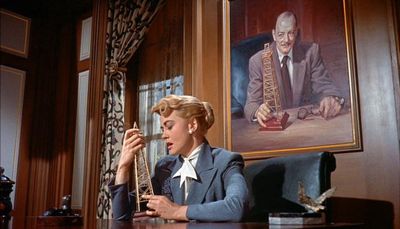
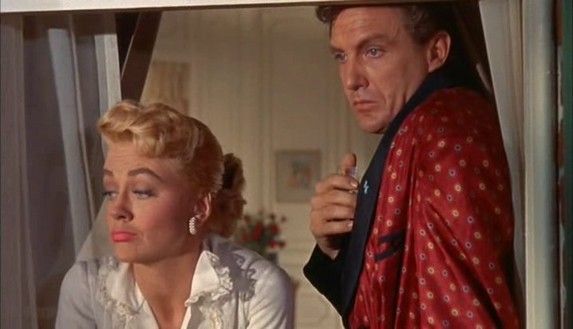
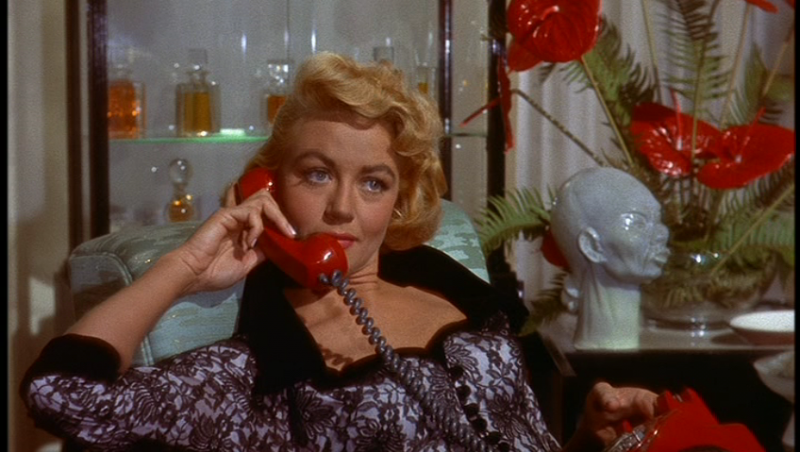
Apparently, I either didn't hit send or my comment of a couple of days ago was eaten. I love this movie and for exactly the reasons you say. Sometimes a little excess is a very good thing. Have you seen All That Heaven Allows? I love that one, too.
ReplyDeleteMaybe it's due to it being our first comments? Who knows. ANYWAY, yes, I've seen All That Heaven Allows, and yes, I liked it very much as well. I tend to like Rock Hudson. I'm looking forward to watching it for a second time to review it. I'm also interested to branch out into a bit more Douglas Sirk than is in the "1001 Movies" book, like his "Imitation of Life."
DeleteI also loved Todd Haynes's Far From Heaven. I thought he captured Sirk's vision of the '50's perfectly. Try it, if you haven't already seen it.
ReplyDeleteI think I've seen Imitation of Life but my memory is hazy. I need to catch up with that again especially since I just watched the '34 version and it would be nice to compare. Too many movies!
I *haven't* seen Far From Heaven, but I have a bit of an inordinate crush on Julianne Moore, so I will DEFINITELY get around to seeing it at some point. I hear you on there being too many movies. My "To Watch" list has hundreds of entries on it.
Delete